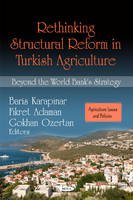18 Nov 2010
Books/ Book Chapters
Aerni, Philipp
,
Häberli, Christian
,
Karapinar, Baris
,
Temmerman, Michelangelo
Rethinking Structural Reform in Turkish Agriculture: Beyond the World Bank’s Strategy

Editors: Baris Karapinar (World Trade Inst., Switzerland); Fikret Adaman and Gokhan Ozertan (Bogazici Univ., Turkey)
Book Description:
Turkish agriculture has been experiencing a period of unique policy experiment over the last couple years. A World Bank-initiated project, called the Agricultural Reform Implementation Project (ARIP), has been at the forefront of policy change. It was initially promoted by the Bank as an exemplary reform package which could also be adopted by other developing countries. It was introduced in 2001 as part of a major International Monetary Fund (IMF)/World Bank-imposed program of “structural adjustment” after the country had been hit by a major financial crisis. The project has finally come to an end in 2009, and there is now an urgent need for a retrospective assessment of its overall impact on the agricultural sector. Has it fulfilled its ambitious objective of reforming and restructuring Turkish agriculture? Or should it be recorded as a failure of the neo-liberal doctrine? This book aims at finding answers to these questions by investigating the legacy of ARIP from a multi-disciplinary perspective.
Table of Contents:
1. Introduction: Rethinking Structural Reform in Turkish Agriculture, pp. 1-10
(Baris Karapinar, Fikret Adaman and Gokhan Ozertan)
2. Rural Transformation Trends and Social Policies in Turkey in the Post-Developmentalist Era, pp. 11-27
(Caglar Keyder and Zafer Yenal)
3. Modernization, Globalization and Development: the State Problem in Turkey, pp. 29-46
E. Fuat Keyman
4. How To Dilute an Agricultural Reform: Direct Income Subsidy Experience in Turkey (2001–2008), pp. 47-61
(A. Halis Akder)
5. Agricultural Policy Reform in Turkey: Sectoral and Micro Implications, pp. 63-85
(Erol H. Cakmak and Hasan Dudu)
6. The Logic of Neoliberal Agricultural Reform Initiatives: Perspectives and Consequences, pp. 87-103
(Koray Caliskan and Fikret Adaman)
7. Agricultural Transformation and the Rural Labor Market in Turkey, pp. 105-148
(Ipek Ilkkaracan and Insan Tunali)
8. Agriculture in Turkey Towards a New Climatic Era: Prospects and Challenges, pp. 149-167
(Ali Kerem Saysel)
9. Water in Turkey: Neoliberal Policies, Challenges and the Road Ahead, pp. 169-187
(Zeynep Kadirbeyoglu and Gokhan Ozertan)
10. ‘Sustainability’ in Agriculture: Stakeholders’ Perceptions in Turkey, pp. 189-210
(Baris Karapinar)
11. Legal–Institutional Framework and Agrobiodiversity Conservation in Turkey, pp. 211-227
(Zuhre Aksoy)
12. Rethinking Agricultural Policy in Turkey in the Context of New Growth Theory, pp. 229-242
(Philipp Aerni)
13. Intellectual Property Rights and Innovation: Promoting New Technologies in Turkish Agriculture, pp. 243-264
(Baris Karapinar and Michelangelo Temmerman)
14. The Legal Framework for Agrobiotechnology in Turkey: The Challenges to the Implementation of the Precautionary Principle, pp. 265-280
(Zeynep Kivilcim)
15. Risk Assessment Problems with Biotech Products, pp. 281-298
(Michael Burkard)
16. Application of Knowledge to Rural Development via New Ict-Tools, pp. 299-317
(Miriam Sahlfeld)
17. Biofuels in Turkey, pp. 319-340
(Asli Isler and Filiz Karaosmanoglu)
18. A Preliminary Impact Assessment of Doha Round Results on Agricultural Policies in Turkey, pp. 341-354
(Christian Haeberli)
19. Standards and their Impacts on the Horticulture Trade, pp. 355-369
(Sufian Jusoh)
20. Conclusions: Beyond the World Bank’s Strategy, pp. 371-378
(Baris Karapinar, Fikret Adaman and Gokhan Ozertan)

